小学英语一般疑问句和特殊疑问句
小学英语四种基本句型肯定句否定句一般疑问句与特殊疑问句
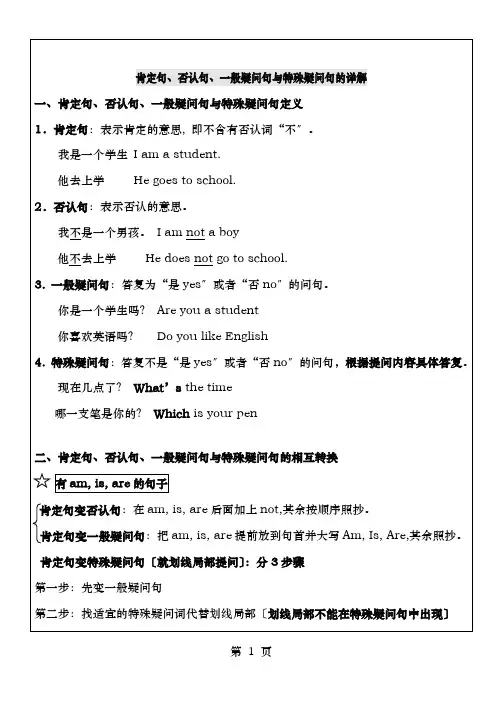
意见
时间
what day 星期几 问星期 How often 多久 问频率
三.句子的种类
标
类别
用法
例句
点
肯定 表达一件事情 或
This is a bag. That's my book.
陈述句
说明说话人的 . I can see a bag over
否认
看法
there.
I don't know.
Are you a student
1.some 变为 any
There are some birds in the tree.→There aren't any birds in the tree.
但是,假设在表示请邀请、请求的句子中,some 可以不变。
Would you like some orange juice
与此相关的一些不定代词如 something, somebody 等也 I want to make a kite.
12、A:_______ one is fatter, the blue one or the red one B: The blue one.
13、A:_______ is your cousin B: He’s 15 years old.
第1页
第三步:特殊疑问词提前放到句首,并大写,其余按顺序照抄,省略划线局部。
1. 肯定句、否认句与一般疑问句的互换 肯定句:This is a book. 否认句:This is not a book. 一般疑问句:Is this a book 肯定答复:Yes, it is. 否认答复:No, it isn’t.
第6页
表示物:They are white sheep. What are they 表示颜色:They are white sheep. What color are these sheep 5、 名词所有格与人 表示名词所有格:She’s Lucy’s sister. Whose sister is she 表示人:She’s Lucy’s sister. Who is she
英语中一般疑问句和特殊疑问句的区别

英语中一般疑问句和特殊疑问句的区别一般疑问句和特殊疑问句是英语语法中两种不同类型的问句。
一般疑问句是用于向对方询问某个陈述句是否属实,通常需要以助动词或be动词开头,并使用倒装结构。
例如:
1.You like coffee.(你喜欢咖啡。
)
2.Do you like coffee?(你喜欢咖啡吗?)
在这个例子中,将原陈述句中的"like"动词提取出来,并使用助动词"do"形成疑问句。
特殊疑问句则是用于询问某个特定信息或事实的问句,通常以特殊疑问词开头。
特殊疑问词包括who(谁)、what(什么)、when (何时)、where(哪里)、why(为什么)、how(如何)。
例如:
1.She went to the party.(她去了派对。
)
2.Where did she go?(她去了哪里?)
在这个例子中,特殊疑问词"where"引导了疑问句,并询问了去派对的地点。
总结起来,一般疑问句主要用于确认陈述句的真实性,通常采用助动词或be动词的倒装形式,而特殊疑问句则用于询问特定信息或事实,以特殊疑问词开头。
小学英语语法一般疑问句和特殊疑问句
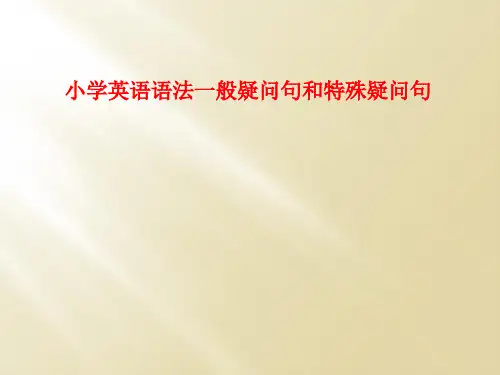
就划线部分提问:(变特殊疑问句) This is a book. 第一步:变一般疑问句
Is this a book? 第二步:找合适的特殊疑问词
Is this what ? 第三步:特殊疑问词提前放到句首,并大写, 其余按顺序照抄,省略划线部分。
What is this?
携手共进,齐创精品工程
Thank You
殊疑问句
表示疑问,有疑问词(在开头),回答有很多种可能。 常用疑问词: When 什么时间 问时间 What time 什么时间 问具体时间,如几点钟 Who 谁 问人 Whose 谁的 问主人 Where 在哪里 问地点 Which 哪一个 问选择 Why 为什么 问原因 What 什么 问东西、事物 What colour 什么颜色 问颜色 What about 。。。。怎么样 问意见 What day 星期几 问星期几
(1)肯定陈述句中本来是没有助动词的,要加上去, 位置在主语(某人或某物)后,动词前。
(2)确定助动词用do、does还是did,根据句中动 词,动词是原形的助动词就用do,动词是第三人称 单数的助动词就用does,动词用过去式的助动词就 有did。 (3)把助动词后提到句首。 (4)原句中动词假如发生变化就要恢复成原形。 强调一点,有some的要考虑是否要用any。
小学英语语法一般疑问句和特殊疑问句
一般疑问句:
表示疑问,一般回答只有两种可能Yes,……或 No,……句中没有疑问词。
如何将一个肯定的陈述句改为否定句:
1、看句中有无be动词,如有,把be动词提到句首即 可。
2、看句中有无情态动词,如有,把情态动词提到句首 即可。
3、如上述二者都没有,就应把助动提到句首。分四 个步骤:
小学英语特殊疑问句和一般疑问句的归纳
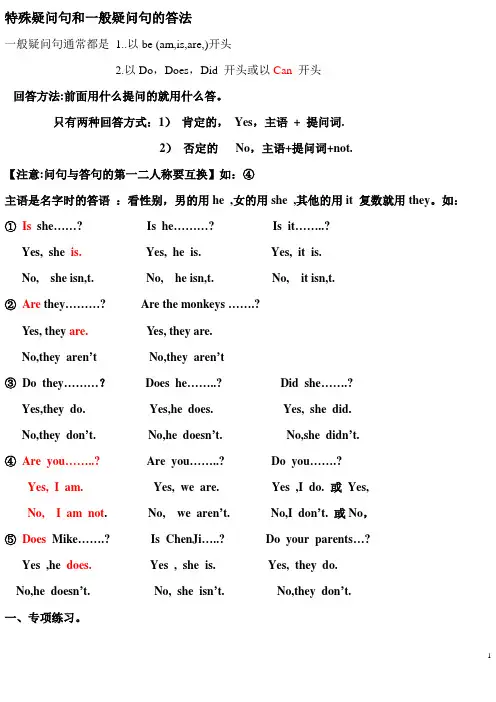
特殊疑问句和一般疑问句的答法一般疑问句通常都是1..以be (am,is,are,)开头2.以Do,Does,Did 开头或以Can开头回答方法:前面用什么提问的就用什么答。
只有两种回答方式:1)肯定的,Yes,主语+ 提问词.2)否定的No,主语+提问词+not.【注意:问句与答句的第一二人称要互换】如:④主语是名字时的答语:看性别,男的用he ,女的用she ,其他的用it 复数就用they。
如:①Is she……? Is he………? Is it……..?Yes, she is.Yes, he is. Yes, it is.No, she isn,t. No, he isn,t. No, it isn,t.②Are they………? Are the monkeys …….?Yes, they are.Yes, they are.No,they aren’t No,they aren’t③Do they………?Does he……..? Did she…….?Yes,they do. Yes,he does. Yes, she did.No,they don’t. No,he doesn’t. No,she didn’t.④Are you……..?Are you……..? Do you…….?Yes, I am.Yes, we are. Yes ,I do. 或Yes,No, I am not. No, we aren’t. No,I don’t. 或No,⑤Does Mike…….? Is ChenJi…..? Do your parents…?Yes ,he does.Yes , she is. Yes, they do.No,he doesn’t. No, she isn’t. No,they don’t.一、专项练习。
1. Did ChenJie read books yesterday?2. Can the girl cook the meals ?—————————————————————————————3.Is he going to swim this afternoon?4. Are they going to take a trip next weend? ————————————————————————————————5.Does he often go to school by bike ? 6. Do you play basketball every weekend? ———————————————————————————————————7. Did Mike do his homework yesterday? 8. Are they playing basketball now?————————————————————————————————一般疑问句及特殊疑问句的总结一般疑问句的定义:用yes或no来回答的疑问句叫一般疑问句。
一般疑问句和特殊疑问句
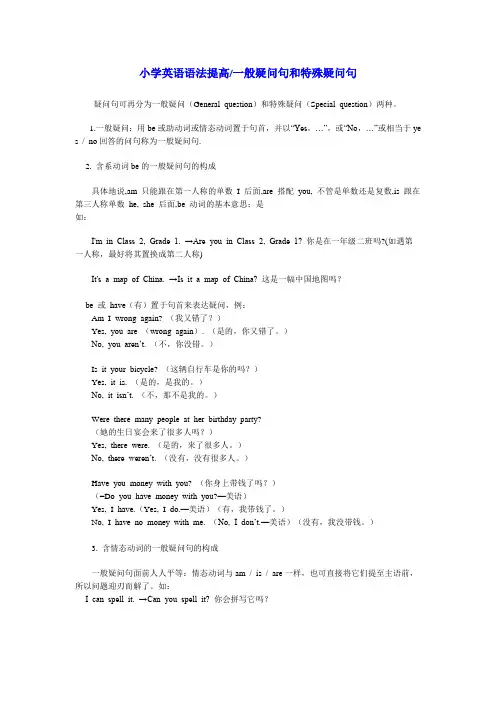
小学英语语法提高/一般疑问句和特殊疑问句疑问句可再分为一般疑问(General question)和特殊疑问(Special question)两种。
1.一般疑问:用be或助动词或情态动词置于句首,并以“Yes,…”,或“No,…”或相当于ye s / no回答的问句称为一般疑问句.2. 含系动词be的一般疑问句的构成具体地说,am 只能跟在第一人称的单数I 后面,are 搭配you, 不管是单数还是复数,is 跟在第三人称单数he, she 后面,be 动词的基本意思:是如:I'm in Class 2, Grade 1. →Are you in Class 2, Grade 1? 你是在一年级二班吗?(如遇第一人称,最好将其置换成第二人称)It's a map of China. →Is it a map of China? 这是一幅中国地图吗?be 或have(有)置于句首来表达疑问,例:A m I wrong again? (我又错了?)Yes, you are (wrong again). (是的,你又错了。
)No, you aren’t. (不,你没错。
)Is it your bicycle? (这辆自行车是你的吗?)Yes, it is. (是的,是我的。
)No, it isn’t. (不,那不是我的。
)Were there many people at her birthday party?(她的生日宴会来了很多人吗?)Yes, there were. (是的,来了很多人。
)No, there weren’t. (没有,没有很多人。
)Have you money with you? (你身上带钱了吗?)(=Do you have money with you?—美语)Yes, I have.(Yes, I do.—美语)(有,我带钱了。
)No, I have no money with me. (No, I don’t.—美语)(没有,我没带钱。
【免费】小学三年级英语语法:一般疑问句及特殊疑问句
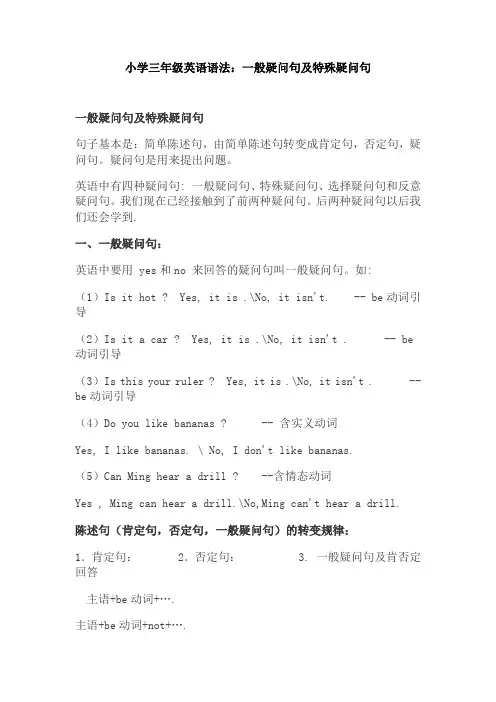
小学三年级英语语法:一般疑问句及特殊疑问句一般疑问句及特殊疑问句句子基本是:简单陈述句,由简单陈述句转变成肯定句,否定句,疑问句。
疑问句是用来提出问题。
英语中有四种疑问句: 一般疑问句、特殊疑问句、选择疑问句和反意疑问句。
我们现在已经接触到了前两种疑问句。
后两种疑问句以后我们还会学到.一、一般疑问句:英语中要用 yes和no 来回答的疑问句叫一般疑问句。
如:(1)Is it hot ? Yes, it is .\No, it isn't. -- be动词引导(2)Is it a car ? Yes, it is .\No, it isn't . -- be动词引导(3)Is this your ruler ? Yes, it is .\No, it isn't . -- be动词引导(4)Do you like bananas ? -- 含实义动词Yes, I like bananas. \ No, I don't like bananas.(5)Can Ming hear a drill ? --含情态动词Yes , Ming can hear a drill.\No,Ming can't hear a drill.陈述句(肯定句,否定句,一般疑问句)的转变规律:1.肯定句: 2.否定句: 3. 一般疑问句及肯否定回答主语+be动词+….主语+be动词+not+….be动词+主语+…?Yes, 主语+be动词./No, 主语+be动词+not.I am a teacher. I am not a teacher. Are you a teacher?--Yes, I am./ No, I am not.My mother is thin. My mother is not /isn'tthin. Is your mother thin?--Yes, she is./ No, she isn't.They are insects. They are not/aren't insects. Are they insects?--Yes. they are./ No, they aren't.主语+情态动词can+…主语+情态动词can+ not+….情态动词can+主语+…?Yes, 主语+情态动词can/No,主语+情态动词can+ notHe can jump. Hecan not/can't jump. Can he jump?--Yes,he can./ No, he can't.主语+动词+….主语+助动词do/does+not助动词do/does+主语+…. 动词原形 +….动词原形?Yes, 主语+助动词do/does.No, 主语+助动词do/does+not.He likes to eat apples. He doesn't like to eat apples. Does he like to eat apples?Yes,he does./ No,he doesn't.We like to eat apples. We don't like to eat apples. Do you like to eat apples?Yes,we do. /No,we don't.二、祈使句:表示请求、命令、建议或劝告等的句子叫祈使句,主语you常省略。
一般疑问句和特殊疑问句 (附练习题及答案
How do you go home?
On foot.
how old
多大
问年龄
How old is he?
6 years old.
how many
多少
问数量
How many books are there in the bookcase?
There are 10.
how much
多少
问价钱
How much is the book?
9. Mrs. Li and Kitty watch television at night.
Do Mrs. Li and Kitty watch television at night? Yes, they do. / No, they don’t.
10. I can finish my homework by myself.
中小学英语一般疑问句和特殊疑问句详解(附练习题及答案)
一、一般疑问句
1、定义:用Yes或No作答的疑问句叫一般疑问句。
2、特点:
1>以be动词am/is/are、助动词do/does、情态动词can/could/may、there be(即there is /are)开头;
例:Is your father a teacher?/ Does Tom like apples? /Can Jenny speak English? /Is there a book on the desk?
There is a book on the desk.→Is there a book on the desk?
2>如果句中没有be动词或情态动词,句首加do的相应形式(do、does、did),且原句的谓语动词要变回原形。
英语普通疑问句和特殊疑问句
英语普通疑问句和特殊疑问句
英语中的疑问句分为普通疑问句和特殊疑问句两种类型。
1. 普通疑问句:以助动词Do或Does开头,表示询问一个事实或情况,通常使用一般现在时。
例如,“Do you like music? 你喜欢音乐吗?”
2. 特殊疑问句:以特殊疑问词(如what、where、when 等)开头,用来询问具体信息或事情的细节。
例如,“When did you start learning English? 你什么时候开始学习英语的?”
无论是普通疑问句还是特殊疑问句,其结构都可以归纳为以下两种:
1. 疑问词+ 助动词/be动词+ 主语(+ 谓语)?
2. 疑问词+ 主语(+ 谓语)?
其中,助动词包括be动词(am/is/are/was/were)、have (has/had)等;主语指句子中的主语(人称代词或名词);谓语指句子中的谓语动词。
需要注意的是,在特殊疑问句中,特殊疑问词需要根据所询问的具体信息来选择。
例如,如果要询问时间,则可以使用what time;如果要询问地点,则可以使用where;如果要询问方式或方法,则可以使用how等。
特殊疑问句和一般疑问句的用法
(一)由be(am,is,are)引导的一般疑问句1、Am I a student? 我是学生吗? Yes,you are./ No,you aren’t.2、Is this /that/it a chair?这/那/它/是一把椅子吗? Yes,it is. /No,it isn’t.3、Is she/Amy your sister?她/艾米是你的妹妹吗?Yes,she is ./ No,she isn’t.4、Is he/Mike your brother?他/迈克是你的哥哥吗?Yes,he is./No,he isn’t.5、Is your brother helpful at home? 你哥哥在家有用吗?Yes, he is./ No, he isn’t.6、Is there a forest in the park? 在公园有一个森林吗?Yes,there is./No,there isn’t. 是的,有。
/不,没有。
7、Are there any panda s in the mountains?在山上有熊猫吗?Yes,there are./No,there aren’t.是的,有。
/不,没有。
8、Are they dusk s? 它们是鸭子吗?(问物)Yes, they are. /No,they aren’t.是的,它们是。
/不,它们不是。
9、Are they famers? 他们是农民吗?(问人)Yes, they are. /No,they aren’t. 是的,他们是。
/不,他们不是。
10、Are you a teacher?你是一个老师吗?(问you 用I回答)Yes, I am./No,I’m not.是的,我是。
/不,我不是。
11、Are you teacher s?你们是老师吗?</P< p>Yes,we are./No,we aren’t.是的,我们是。
小学英语一般疑问句和特殊疑问句(附练习题)
英语肯定句、否定句、一般疑问句和特殊疑问句的详解一、be动词:am, is, are二、肯定句、否定句、一般疑问句和特殊疑问句定义1.肯定句:表示肯定的意思, 即不含有否定词“不”。
比如:我是一个学生I am a student.他去上学He goes to school.2.否定句:表示否定的意思。
比如:我不是一个男孩。
I am not a boy他不去上学He does not go to school.3. 一般疑问句:回答为“是yes”或者“否no”的问句。
比如:你是一个学生吗?Are you a student?你喜欢英语吗?Do you like English?4. 特殊疑问句:回答不是“是yes”或者“否no”的问句,根据提问内容具体回答。
比如:现在几点了?What’s the time?哪一支笔是你的?Which is your pen?am, is, are后面加上not,其余按顺序照抄。
肯定句变一般疑问句:把am, is, are提前放到句首并大写Am, Is, Are,其余照抄。
:分3步骤第一步:先变一般疑问句第二步:找合适的特殊疑问词代替划线部分第三步:特殊疑问词提前放到句首,并大写,其余按顺序照抄,省略划线部分。
如:Li ming 's not here today.Who's not here today? 今天谁没来?例如:1.肯定句、否定句和一般疑问句的互换肯定句:否定句:一般疑问句:Is this a book?肯定回答:Yes, it is.否定回答:No, it isn’t.2.就划线部分提问(变特殊疑问句)This is a book.第一步:变一般疑问句Is this a book?第二步:找合适的特殊疑问词Is this what ?第三步:特殊疑问词提前放到句首,并大写,其余按顺序照抄,省略划线部分。
do not或者does not,其余按顺序照抄动词用原形肯定句变一般疑问句:在句首加do或者does并大写,其余照抄。
- 1、下载文档前请自行甄别文档内容的完整性,平台不提供额外的编辑、内容补充、找答案等附加服务。
- 2、"仅部分预览"的文档,不可在线预览部分如存在完整性等问题,可反馈申请退款(可完整预览的文档不适用该条件!)。
- 3、如文档侵犯您的权益,请联系客服反馈,我们会尽快为您处理(人工客服工作时间:9:00-18:30)。
一般疑问句在英语的学习中,一般疑问句的转换及回答是经常碰到的问题,现在我们就来探讨一下有关一般疑问句的问题。
一、什么是一般疑问句用Yes或No作答的疑问句叫一般疑问句。
一般疑问句还有下列特点:1、以be动词、助动词或情态动词开头;例:Is your father a teacher? Does Catherine like animals? Can Jenny speak French?2、往往读升调;3、译成汉语,都可以带上“吗”,例如上面三句可分别译为:你父亲是老师吗?凯瑟琳喜欢动物吗?詹妮会说法语吗?二、如何将述句变成一般疑问句?要将述句变成一般疑问句,可以遵循下列步骤:1.看句中有没有be动词(am、is、are、was、were)、助动词(do、does、did、have、had)或情态动词(can、must、will、may等),如果有,将其提到句首,句末打上问号即可。
例:It was rainy yesterday. →Was it rainy yesterday?Tom's father can play the piano. →Can Tom's father play the piano?I have finished my homework. →Have you finished your homework?2.如果句中没有be动词、助动词或情态动词,则根据谓语动词的形式借助do的相应形式放在句首。
具体方法是:如果谓语动词是原形,则借do;如果谓语动词是一般现在时第三人称单数形式,则借does;如果谓语动词是过去式,则借did. 需要注意的是,借does或did后,原句的谓语动词要变回原形。
例:They go to school by bike. →Do they go to school by bike?Bill gets up at 6:30 every day. →Does bill gets up at 6:30 every day?The students saw a film yesterday. →Did the students see a film yesterday?三.述句变一般疑问句应注意的事项述句变成一般疑问句除了遵循上述规则以外,还应注意下列几点:1.如果述句中有第一人称,则变问句时最好要变为第二人称。
例:I usually have lunch at school. →Do you usually have lunch at school?My father is playing soccer. →Is your father playing soccer?2.如果述句中有some, 则变问句时往往要变成any 。
例:There is some water on the playground. →Is there any water on the playground?3.复合句变一般疑问句通常只变主句,从句不变。
例:I know he comes from Canada. →Do you know he comes from Canada? 4.如果句中含有实义动词have且表示“有”时,除借do外,也可将其直接提到句首。
例:I have some friends in America.→Have you any friends in AmericaDo you have any friends in America? 四.一般疑问句的回答一般疑问句往往采用简短回答,共由三部分(三个单词)组成,对这三部分(三个单词)的确定可以概括例下:1.第一个词:不是Yes就是No。
(有时根据语气的不同,Yes可由Sure, Certainly, Of course等代替.NO可由sorry 代替.)2.第二个词:问谁答谁。
即答语中的主语须与问句的主语一致(但必须用主格代词)。
例:Does she clean her room every day? Yes, she does.Is Anna′s father a doctor? No,he isn′t.如果主语是this that,回答时用it 代替,如果问句中主语these, those,回答时用they′代替。
3.第三个词:用什么问,用什么答。
即沿用问句中的引导词。
Can Jim play soccer? Yes, he can./Does Mr Bean speak English? Yes, he does. 需要注意问题:(1).用may 引导的问句,肯定回答用may,否定回答用can′t 或mustn′t,(2)用must 引导的问句,肯定回答用must,否定回答用needn′t.例:May I go to the park now? Yes, you may. /No, you mustn′t.Must I wash my clothes now? Yes, you must. /No, you needn′t.4.用No开头作否定回答时,结尾要加上not。
因为回答必须是三部分,所以否定回答必须缩写,而肯定回答不能缩写。
例:Did Thomas come here yesterday? Yes, he did./ No ,he didn′t.Is Lin Lin in Class 3? Yes, she is. / No, she isn′t.或(No, she′s not).特殊疑问句以疑问词开头,对句中某一成分提问的句子叫特殊疑问句。
常用的疑问词有:what who whose which when where how why等。
特殊疑问句有两种语序:1.如疑问词作主语或主语的定语,即对主语或主语的定语提问,其语序是述句的语序:疑问词(+主语)+谓语动词+其他成分?如:who is singing in the room﹖whose bike is broken﹖2.如疑问词作其他成分,即对其他成分提问,其语序是:疑问词+一般疑问句语序?如:what class are you in﹖What does she look like﹖Where are you from﹖What time does he get up every morning﹖How do you know﹖特殊疑问词+助动词+主语+动词原形+其他?eg:Where do you do study English?特殊疑问词+be动词+主语+其他?eg:Why is your Mum so angry?特殊疑问词+情态动词+主语+动词原形+其他?eg:What can I do for you? 注意:1回答特殊疑问句时,不能用yes/no,即问什么答什么,尤其是简略回答.如:Who is from Canada﹖Helen (is).Where's the restaurant﹖Near the station.Why do you like koalas﹖Because they are cute.一般疑问句练习题1. His father is an English teacher.2. These cats are crying.3. They can swim.4. I like to read English.5. I go to school on foot.6. He likes English.7. His father goes to work by bus.8. He is crying under the tree.9. His birthday is on the twentieth of November.10. Mrs. Li and Kitty are in a big shop.12. The boy under the tree is hungry.13. He goes to school every day.15. I want to have a model car.16. She wants a cup of coffee.17. Mrs. Li and Kitty watch TV at night.18. I do my homework after school.特殊疑问句练习题(一)一、选择正确的单词填空(who, where, when)1._____ is that pretty girl? She is my sister.2._____ are Jack and Tom? They are behind you.3._____ do you go to school? I go to school from Monday to Friday.4._____ has a beautiful flower? John has a beautiful flower.5._____ are they? They are my parents.6._____ is my mother? She is in the living room.7._____ are you going? We are going to the bakery(面包坊).8._____ do Jim and Wendy play ball? They play ball in the afternoon.9._____ does he jog? He jogs in the park.10._____ are you from? I'm from Changchun city.二、就画线部分提问1.He is my father.2.They are under the tree.3.I often watch TV after dinner.(晚饭后) 提示:饭后强调的是时间问题。
4.Lily swims in the swimming pool.(游泳池)5.I often brush my teeth in the evening.6.Alan likes to play with Bill.7.Joe's father plays badminton(羽毛球) every weekend.8.The supermarket is near the school.9.The computer is on the table.10.The flowers are in the flower pot(花盆).11.My grandpa took us to the zoo.12.The monkey sleeps at night.特殊疑问句练习(二)一.用what time, what color, what day, what填空。
